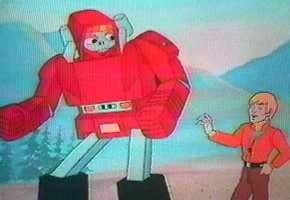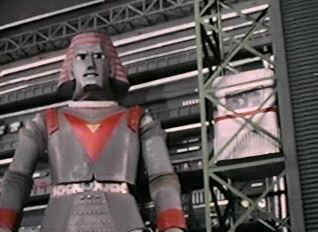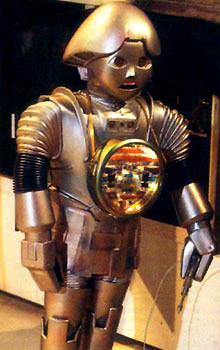I
have fond memories of Robot Jox in the theater, back in 1990.
I was in college at the time, and taking a course on writing
science fiction, taught by a local English professor who did SF on
the side. It happened
that this professor was friends with Joe Haldeman, the esteemed SF
writer responsible for The Forever War and many other novels,
and Joe had written the script to this movie, and our professor
suggested we go and see the movie on our own time, and then we could
all meet in the faculty offices and conduct a conference call with
Mr. Haldeman. This
seemed a fine idea at the time.
Then we got to see the movie.
 We
open with a brief explanation of the situation in the time-honored
tradition of the screen crawl. In
the brave new world, post WWIII, war has been outlawed; instead,
conflicts are resolved through mechanized gladiatorial combat.
While they’re not called by the same names, the remaining
superpowers are the
United States
and the
Soviet Union
(this was written pre-Berlin Wall, after all).
The environment is so polluted that the population wears SARS-like
face masks. And everyone
lives in a slum and can’t read, which is why they spell
“jocks” J-O-X, and somebody scrawls “cowerd” on a wall about
halfway through the movie. And
population is so low (and the quality of kids so poor) that they
have to breed in test tubes for combat skills, fearlessness, and
‘80s hair with little padawan braids, and they have these
billboards all over the place encouraging reproduction, not the way
fun way but by showing pregnant women with the tagline PRE.
NA. TAL.
And armed, helmeted stormtrooper-like guards exist
everywhere, making future faux-USA seem worse than the modern USSR
(a development that must have seemed ludicrous in 1990, but seems
all too plausible 14 years later).
And there are giant robots.
We
open with a brief explanation of the situation in the time-honored
tradition of the screen crawl. In
the brave new world, post WWIII, war has been outlawed; instead,
conflicts are resolved through mechanized gladiatorial combat.
While they’re not called by the same names, the remaining
superpowers are the
United States
and the
Soviet Union
(this was written pre-Berlin Wall, after all).
The environment is so polluted that the population wears SARS-like
face masks. And everyone
lives in a slum and can’t read, which is why they spell
“jocks” J-O-X, and somebody scrawls “cowerd” on a wall about
halfway through the movie. And
population is so low (and the quality of kids so poor) that they
have to breed in test tubes for combat skills, fearlessness, and
‘80s hair with little padawan braids, and they have these
billboards all over the place encouraging reproduction, not the way
fun way but by showing pregnant women with the tagline PRE.
NA. TAL.
And armed, helmeted stormtrooper-like guards exist
everywhere, making future faux-USA seem worse than the modern USSR
(a development that must have seemed ludicrous in 1990, but seems
all too plausible 14 years later).
And there are giant robots.
Technically,
the machines in Robot Jox are not really robots
as much as they are anthropomorphic vehicles.
An onboard human is in control of all the mech’s functions,
with very little automation or independent computer control;
therefore, while the term “giant robot” is popular and summons
up quite the vivid imagery, it is not strictly accurate.
But who cares? Let’s
see a couple of them duke it out!
As
you can tell, there’s a lot of little details, like the general
poverty and the illiteracy, that’s thrown in there as dressing.
Unfortunately, it’s not really touched upon, beyond an
unnecessary scene where the main character visits his brother and
has the “how’s the reading business going?” conversation.
The major plot revolves around Achilles (Gary Graham, best
known for playing Matt Sikes on the “Alien Nation” TV
series), the last surviving active jock of the faux-USA gladiatorial
team. His buddy, Tex
Conway (the late Michael Alldredge, who was in “V” and Iron
Eagle, among many others), also survived, but he’s finished
his contract and retired to a desk job.
Why are there only two left?
It seems the top jock on the faux-Soviet side, Alexander
(Paul Koslo, a fine German actor who has made a career out of sci-fi
B-movies like Project: Shadowchaser) has a tendency to kill
his defeated opponents. Nothing
like being smooshed to death by a giant robot foot to really produce
a closed casket funeral (unless it’s being smooshed to death by a
giant anthropomorphic vehicle foot… okay, I’ll stop and bow to
convention for the rest of the review).
There’s also a whole plot element about espionage, as the
faux-Soviets have a tendency to find out about the faux-USA’s new
weapons, allowing them to come up with defenses.
Anyway,
Achilles and Alexander fight, and there’s some poorly-thought-out
heroics, and the match ends in a draw.
Achilles, his contract having been for twenty fights, claims
he’s done, while everyone else claims the fight’s not over until
someone wins. Two go in,
one comes out, unless there’s a contract dispute.
The next generation of pilots are all specially bred from
test tubes—“tubies,” as they are unkindly called.
They don’t get why Achilles is having th e
emotions he’s having. Alexander,
trained his whole life in the true faux-Soviet way, also doesn’t
get it. It’s not until
Achilles falls for one of the tubies, a girl called Athena, and
tries to protect her (only to be betrayed by her competitiveness)
that he ends up getting back in the saddle.
e
emotions he’s having. Alexander,
trained his whole life in the true faux-Soviet way, also doesn’t
get it. It’s not until
Achilles falls for one of the tubies, a girl called Athena, and
tries to protect her (only to be betrayed by her competitiveness)
that he ends up getting back in the saddle.
Let’s
be honest here: this is probably the best live-action “giant
fightin’ robot” movie in existence.
That said, it’s not all that great.
Oh, don’t get me wrong; the mechs are okay.
They’re obviously stop-motion models, but that often works
with false machinery. By
and large, I found the mecha weaponry to be quite amusing; I’m not
sure how effective some of them would be (the flying fist, or the
pneumatic auto-punching fist), but many of them (lasers, flash-bang
blinders, chainsaw, missiles) are inherently effective.
Providing they’re used right: if you’ve got a device that
will blind your opponent for up to 90 seconds, you don’t want to
waste those 90 seconds just standing around, like they did here.
Yeah, a minute and a half isn’t all that much time, but you
could have walked up and punched him in that space, surely!
Anyway,
the mechs show some interesting qualities.
They apparently can launch from Death Valley into orbit, with
no stages or boosters, and they can land safely… back on the Death
Valley playing field, which I don’t really get, but I guess they
just had the one set. When
Achilles’s mech is damaged (you don’t get points for guessing
where), he can morph into a more compact, tread-driven vehicle.
Which, naturally, means that the faux-Soviets represent the
Decepticons, by technological default AND by narrative structure.
I
do, however, wonder “why giant fightin’ robots?”
I mean, in a resources-starved future, wouldn’t it be more
sensible and economical to pit two men against each other?
Even in person-sized battle armor (a la Lost in Space),
you’d be hard-pressed to reach one thousandth of the cost of those
battle-mechs, particularly when you factor in the support systems,
the giant elevators, the huge spaces necessary to create a
battlefield, etc. And
the risk to the spectators would be greatly reduced.
Cost and risk aside, we’re shown that jocks are so
well-trained in martial arts, they can take on half a dozen or so
opponents, using moves their robots wouldn’t have a dream of
pulling off. Even if you
still wanted to make it machines, instead of just men, why do they
have to be giant robots? Again,
much more economical to make a tank, or a fighter jet.
Better yet, since the technology obviously exists to reach
space, just have the combats in orbit.
That way, you can build more effective machines that don’t
have to worry about gravity or spectators or anything like that.
If
nothing else, why can’t they build a robot that has some sort of
emergency remote off-switch? At
different points in the final battle, both sides could have used
such a device.
Perhaps
they would have created person-sized battle armor if the technology
had been up to it. It
seems WWIII blew everything back so far that the TRS-80 is the state
of the art in computing, and your hovercraft’s remote control is
about the size of your head. On
the other hand, they have hovercraft, which are not only light
enough to carry passengers, but are also strong and dense enough to
punch through a building’s walls and remain operational.
So the technology is all over the place, yet it appears
simple enough that the rampant illiteracy doesn’t keep people from
knowing how to hotwire what little advanced tech there is, even that
belonging to the other side. Mind
you, all that native ingenuity doesn’t explain how they can build
the giant robots in the first place.
And, in the end, the robots don’t matter so much, as it
goes from giant fightin’ ro bots
to two men beating each other with sticks.
So, I guess the tech is not all it’s cracked up to be.
bots
to two men beating each other with sticks.
So, I guess the tech is not all it’s cracked up to be.
There’s
a strong undercurrent of homoeroticism throughout the movie, even
with the romantic subplot between Achilles and Athena.
I mean, it’s one thing to mount a concealed chainsaw in
your mech, it’s quite another to have it fold out of your mech’s
crotch. And there’s
also a number of kicks and punches to the… um… junk.
If robots had junk. But
that would be presupposing that robots had sex.
With each other, not with humans (as we all know, a sex robot
for humans has been on the drawing boards for quite some time). Even the
romantic subplot is rather undercut by the fact that Athena is made
to look like a shapely young Obi-Wan Kenobi with an MC Hammer perm.
Now, there’s nothing wrong with all that; even in the
population-starved future, you have to have all kinds to make a
world, and your sexual preference shouldn’t have anything to do
with whether or not you can drive a robot.
However, in this case, it’s either accidental, or, put in
the context of sports, is making a satire of the “manly man”
sports fan or player. Actually,
it might help explain the ending if Alexander’s aggressiveness
could be attributed to shame over his own latent homosexuality, and
Achilles, as an “out and proud” jock, would have finally gotten
through to him for the touching dénouement.
Because otherwise, that ending just comes out of nowhere.
The last couple of minutes completely ruined the whole rest
of the movie for one of my friends, in fact, almost to the point wh ere
she refuses to discuss the movie.
ere
she refuses to discuss the movie.
On
the other hand, in that interview with Joe Haldeman, he asked which
of the several endings he wrote was actually used.
When they told him, his response was along the lines of, “I
was afraid of that.” Which
goes to show you how much pull writers have in even low-budget
cinema.
The
movie wasn’t all that bad, but it wasn’t all that good, either.
The leads do a decent job, more or less, but nobody set a new
benchmark for performance, and there are cringe-worthy moments
aplenty for everyone. When
you consider the budget director Stuart Gordon (director of Re-Animator,
From Beyond, Space Truckers, and many others) had to
work with, you can be a bit more forgiving.
It would almost be better if Gordon had written the
screenplay; not to knock Mr. Haldeman’s talents at all, but a
director working with his or her own ideas is better able to turn a
limitation into an advantage, Robert
Rodriguez-style. However,
the interference and difference of opinion and taste between
director and writer might explain why the plot, as filmed, was
relatively predictable; who knows how much it would have changed if
Haldeman had done the whole thing?
The
film earns all four Hoffs, despite my personal appreciation of it.
I mean, even in 1990, you could have imagined a better future
than this, and there’s no lack of blame to go around.
But it’s lots of fun for those like us, and you just
can’t knock the giant fightin’ robot action (much).

It’s
hard to believe one of the actors billed in the credits, Jeffrey
Combs, has only this much screen-time.
I guess he and Gordon are old buddies still, as they’re
still cranking out Lovecraft movies, but this is taking favoritism a
bit far.
It
really is a dark, bleak future when a famous jock with the fate of
nations depending on him can only score that tiny apartment.
You know, they go to lengths to make it seem like it’s
space-saving, but there are so many implausibilities to that, it’s
like watching The 5th Element again.
When
you use a one-shot surprise weapon, make sure it’s to your
advantage, doofus.
During the climax, when Achilles’s robot gets shot up, that’s
when those of you with a classical education groan and shake their
heads.
Was anyone else waiting for a “The End… Or Is It?” after the
award-winning finale?
-- Copyright 2005, E. M. S. Mitchell(!)

